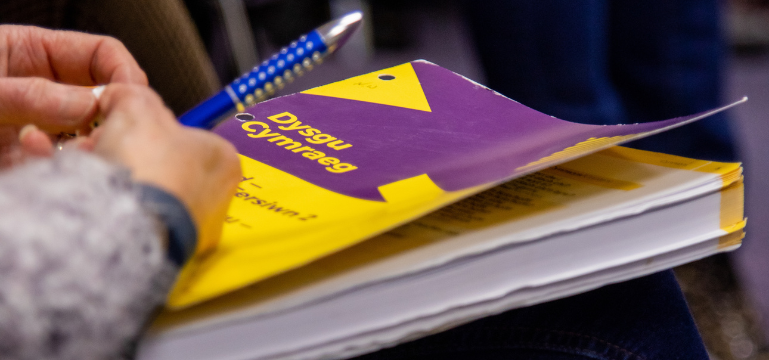Providing opportunities for learners to refine their language skills and learn more about culture, history and current affairs through literature and poetry.

Quick links:
- Information about the school/provider
- Context and background to the effective or innovative practice
- Description of the nature of the strategy or activity
- What effect has this work had on provision and outcomes for learners and/or their families?
- How have you shared your good practice in the school, the sector and beyond?
Information about the school/provider
Learn Welsh Glamorgan (LWG) is one of 10 providers of the National Centre for Learning Welsh and is responsible for providing Welsh for adults courses in the Bridgend, Rhondda Cynon Taf and Merthyr areas and online. LWG is part of the Faculty of Life Sciences and Education (FLSE) at the University of South Wales.
Context and background to the effective or innovative practice
Following enquiries from learners who wanted to expand their understanding and knowledge of the Welsh language, LWG began to establish courses that focus on literature, particularly short courses and later, a poetry course. The 10-week poetry course, ‘O’r gair i’r gerdd’, now provides opportunities for learners to practise and develop their poetry skills, as they discuss Welsh poetry through the medium of Welsh. This course helps learners to improve their skills by using the language creatively and socially, combining language learning with reflecting on the culture and history of the Welsh language. This approach provides a new and attractive way of engaging with the language, by reducing the barriers that prevent learners from dealing with the language in more formal or traditional environments.
Description of the nature of the strategy or activity
The activity includes studying poems and exploring poetry techniques such as ‘cynganeddu’ and other styles, with tutors providing guidance and encouraging learners to create their own poetry between sessions. The tutor also uses examples of poems inspired by different areas, such as music, history and famous poets, to prompt learners to think creatively. In addition to this, the tutor publishes learners’ poems during the sessions, showing recognition of their work and encouraging new themes by considering and recognising that inspired their creation. Many learners have submitted their poems to local eisteddfodau, showing the high level of skills and creativity developed through the course. This way of practising and working together also promotes the value of sharing and exploring ideas in a way that gives value to the Welsh language in the modern-day world.
What effect has this work had on provision and outcomes for learners and/or their families?
This work has had a significant positive effect on learners, by helping them to develop their understanding and skills in the Welsh language and poetry. Learners are given an opportunity to learn more about culture, history and current affairs, in addition to developing critical and creative skills. This work also provides a platform for learners to discuss ideas and opinions and encourages them to consider social problems in a Welsh way. In terms of families, the effect is clear as learners become more confident Welsh speakers and as they participate more actively in the Welsh speaking community. Learners value the opportunity to work creatively and develop their skills when using the language in other contexts, reflecting their evaluation of the Welsh language and culture. It also helps to create learners who have fostered a sense of pride in their use of the Welsh language and becoming active Welsh speakers.
How have you shared your good practice in the school, the sector and beyond?
Good practice has been shared widely across the Learn Welsh sector. It will also be shared on the Learn Welsh Glamorgan digital platform, which provides access to resources and information about the activities and strategies used in the courses. These strategies will be shared among the academic teams of the Faculty and the Welsh Language Unit of the University of South Wales, enabling other staff and researchers to share and investigate the effectiveness of learning methods and activities. Through these media, the practice is spread more widely, by creating opportunities for continuous learning and development among members of the sector and others who are involved in learning the Welsh language.